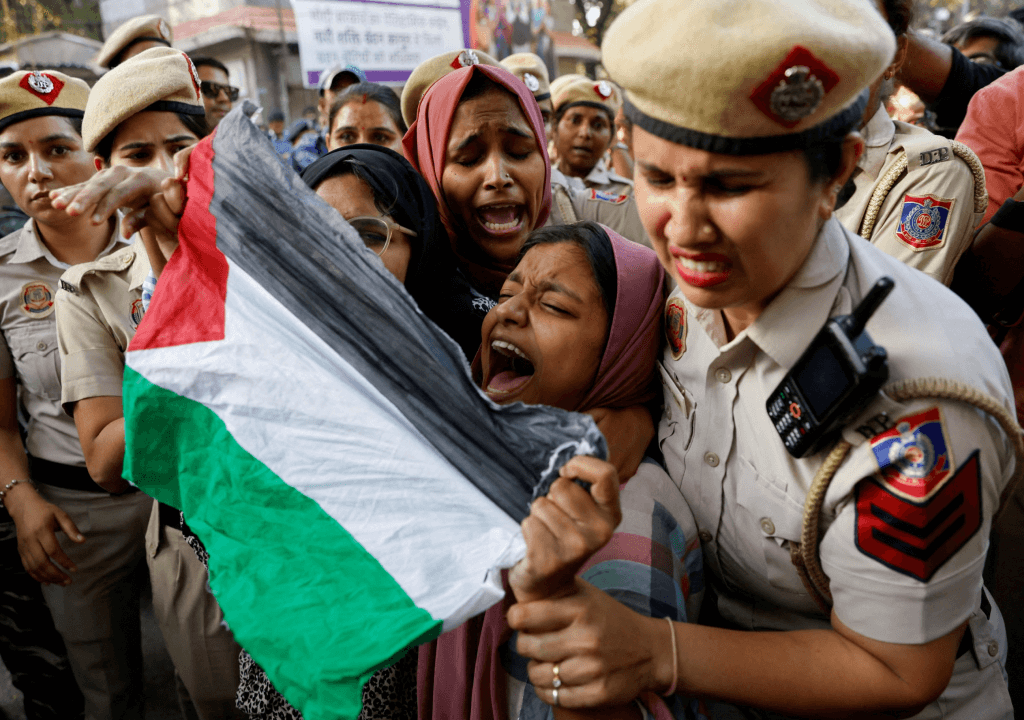Why Is South Asia So Involved in the Israel-Palestine Conflict?
October 1, 2024

There are countless problems to be fixed in the poor South Asian countries, including India, Pakistan, Sri Lanka, Bangladesh, Maldives, and Nepal. Even though they have different positions and perspectives, they all struggle with poor living conditions, lack of employment, corruption, political dynasties, and more. While these issues dominate the daily lives of their populations, they are increasingly focused on a different concern: the Israel-Palestine conflict, which they seem to adopt as their own. In India, society is divided between pro-Israel and pro-Palestine supporters, and it has become a heated topic in Pakistan, where pro-Israel sentiment is almost unthinkable, but people have taken to the streets in support of Palestine. On September 29, pro-Hezbollah protesters clashed with police in the streets of Karachi, Pakistan’s largest city, after demonstrators attempted to reach the U.S. Consulate. The police fired tear gas as protesters threw stones and attempted to breach barriers. A similar wave of unrest is also rising in Bangladesh. Why? Why are these countries so deeply involved in this conflict?
The answer is clear and specific: religion. South Asia is deeply intertwined with religion. Both the population and administration are heavily influenced by religious beliefs. The region, which is the birthplace of prominent religions like Hinduism, Buddhism, Jainism, and Sikhism, is also home to around 600 million Muslims. Clashes between followers of Indian religions and Islam, as well as intra-Islamic conflicts, are common in these countries. Since Palestine is an emotional issue for Muslims globally, it has always featured prominently in South Asian society and politics. The Islamic countries in the region—Pakistan, Bangladesh, and the Maldives – harbor strong animosity toward Israel. Every incident in Gaza and the West Bank brings people to the streets, sparking anti-Israel protests. Calls for tougher actions by their governments against Israel, as well as protests against Western embassies and consulates, are common in these nations. Fundamentalist and terrorist groups unite in their anti-Israel stance, advocating for the boycott of Israeli products. Politicians in these countries are often reluctant to engage with Israeli officials because, regardless of their achievements, they risk being labeled as anti-religious or anti-national. The ongoing events in Gaza and Lebanon have further fueled hatred towards Israel among the population. Many Pakistanis believe that, as a nuclear power, Pakistan could do more to support groups fighting the holy war against Israel by supplying weapons, and they are willing to join the fight. A similar sentiment prevails in Bangladesh. Many believe that if the current conflict escalates into regional wars, people from Pakistan and Bangladesh, who are largely poor, unemployed, but deeply religious, could be recruited by these groups.
In India, the situation is more complex. The socialist, communist, and Islamist parties, which rely on the votes of the more than 15 million-strong Muslim population, have consistently raised the Israel-Palestine issue in the public sphere. The Indian National Congress (INC), the grand old socialist party that led the government for most of independent India’s history, supported the two-state solution, recognizing both Israel and Palestine. However, the party and its government gave a clear preference to Palestine and its leaders, who were often celebrated as revolutionaries, with the Indian media also contributing to India’s pro-Palestine stance.
However, when Narendra Modi and his Bharatiya Janata Party (BJP), a Hindu nationalist party, came to power in 2014, the situation changed dramatically. While the government did not abandon the two-state solution, it shifted away from its pro-Palestine stance and gave more support to Israel. Modi, who developed a personal friendship with Israeli Prime Minister Netanyahu, strengthened the relationship on a national level as well. Consequently, the Indian government became more aggressive in countering pro-Palestine narratives, promoting India’s historical ties with Jews, and pushing a more pro-Israel perspective.
Cities in India that once saw massive rallies in solidarity with Palestine now witness almost no demonstrations for the cause. As the public became more educated about the Israel-Palestine conflict from its roots, many began to see Palestine as primarily an Islamist issue. As a result, Islamist organizations in India no longer receive the widespread public support they once did, causing significant disappointment among the country’s Muslim population
This evolving landscape of distrust and fundamentalism has become another major concern in the region. South Asia has no direct connection to the Israel-Palestine conflict beyond religious ties, but it is now causing further divisions within societies, most visibly in India. India’s shifting stance towards Israel has generated significant discontent among its Islamic neighbors, causing their hatred for Israel to also evolve into hostility towards India. This is clearly evident in social media spaces, where Indian groups and those from neighboring Islamic countries are often in conflict. As always, this deepens the divisions within societies that are already fractured by religious views. Therefore, we can say that, aside from Israel and its immediate neighbors, South Asia is also heating up under the mounting tensions between Israel and Hezbollah.
No comments:
Post a Comment